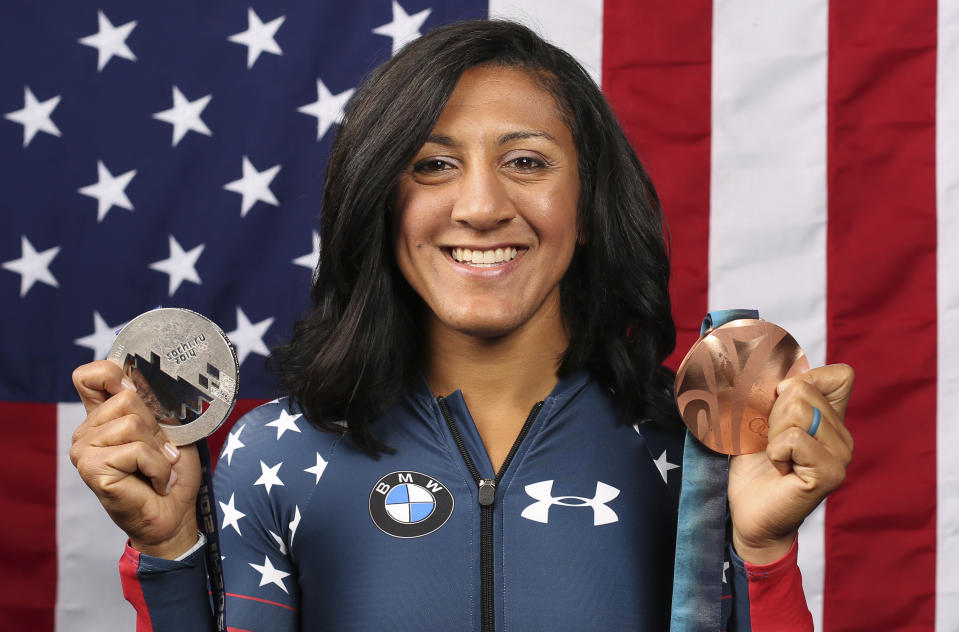Three female Olympians pledge to donate their brains for concussion research

Days before the 2018 Pyeongchang Olympics are set to begin, three Olympians have pledged a significant donation that could help future generations of athletes. But it’s not a donation of money or equipment or time. The donations that bobsledder Elana Meyers Taylor and hockey players Angela Ruggiero and Hayley Wickenheiser are making are much different.
BREAKING: U.S. #Olympic bobsledder @eamslider24 & U.S. ice hockey legend @AngelaRuggiero have pledged to donate their brains to the Concussion Legacy Foundation as we approach the #WinterOlympics. Read more:#MyLegacyPledgehttps://t.co/MPcUXvFerC pic.twitter.com/ZRIjLdPCli
— Concussion Legacy Foundation (@ConcussionLF) February 6, 2018
BREAKING: Canadian ice hockey legend and 6x Olympian Hayley Wickenheiser (@wick_22) has pledged to donate her brain to CLF. #MyLegacyPledge: "I am determined to leave hockey better and safer."
Read more:https://t.co/otDC8d8cp6 pic.twitter.com/pP2xytAWqR
— Concussion Legacy Foundation (@ConcussionLF) February 6, 2018
Meyers Taylor, Ruggiero, and Wickenheiser have all pledged to donate their brains to the Concussion Legacy Foundation after their deaths. The CLF collaborated with the Boston University School of Medicine and the US Department of Veterans Affairs to form the VA-BU-CLF Brain Bank, which is dedicated to studying CTE and houses 70% of the world’s CTE cases. Since CTE can only be definitively diagnosed after death, brain donations are vital to continuing the study of CTE and other traumatic brain injuries.
But the donations from Meyers Taylor, Ruggiero, and Wickenheiser are especially important. Only 3% of the brains donated to the Brain Bank are female, which makes comparable research difficult. Female brains respond differently to trauma than male brains, but it’s hard to discover more about that when there aren’t enough female brains to research. When making the pledge to donate her brain, Meyers Taylor, who is headed to her third Olympics to compete in the two-woman bobsled, told the CLF why this was so important to her.
“A concussion nearly ended my career in 2015. I wish I had known more about the risks of returning too quickly, and I am pledging my brain to encourage athletes in all sports and at all ages to get educated through the Concussion Legacy Foundation. I also want to support CTE research, knowing that female contact sport athletes are at risk. The long-term consequences of brain trauma are a major concern in sports, and I’m doing this for every athlete that will follow in my footsteps.”
Even though football gets much of the national focus when it comes to concussions and their long term effects, any athlete at any age in a contact sport is at risk for concussions. Accidents in bobsled, Meyers Taylor’s sport, can be terrifying. When a bobsled tips over, the rider is at the mercy of speed, often with their helmeted head banging against the ice until the sled stops.
Both Ruggiero and Wickenheiser have retired from playing Olympic hockey, but they’re in Pyeongchang and have taken on new Olympic roles. Ruggiero is the chair of the International Olympic Committee Athletes’ Commission, and Wickenheiser is a member of that commission. They know that concussions in hockey are no less damaging than concussions in football, and Wickenheiser has has seen the effects first hand.
“Steve Montador was a friend, and when he was diagnosed with CTE after his death in 2015, I became inspired to do my part to fight this disease. By pledging my brain to the Concussion Legacy Foundation and the researchers at the VA-BU-CLF Brain Bank, I hope to support the best science and accelerate the development of ways to prevent and treat CTE.”
Wickenheiser, Ruggiero, and Meyers Taylor are all decorated, talented, and dedicated athletes and Olympians, and the Concussion Legacy Foundation is hoping that their public pledge inspires other female athletes to donate their brains. Because there is important research to be done on the effects of trauma on the female brain, and it can’t be done without help.
– – – – – –
Liz Roscher is a writer for Yahoo Sports. Have a tip? Email her at lizroscher@yahoo.com or follow her on twitter! Follow @lizroscher


